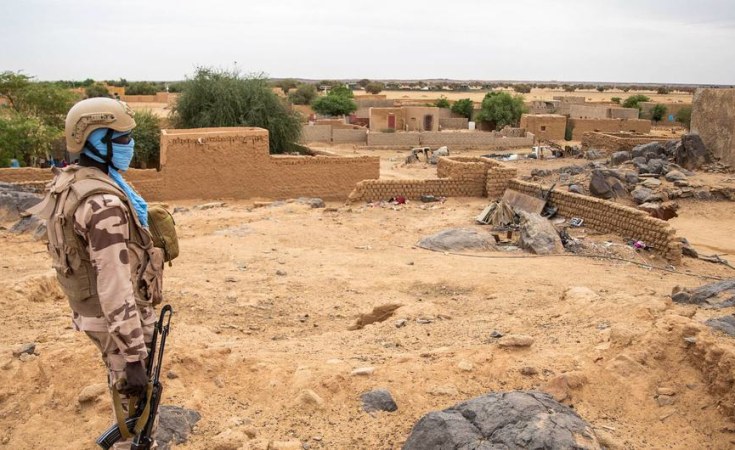Germany will be the largest provider of troops in Mali following the UN's decision to extend its peacekeeping mission. But one important security measure will be missing after France's troop withdrawal in the autumn.
The UN Security Council on Wednesday extended a 9-year-old peacekeeping operation in Mali -- known as MINUSMA -- for another 12 months.
But MINUSMA will continue without French air support as in the past, compounding the risk for one of the UN's deadliest peacekeeping operations.
For a long time, the decision to extend the mission hung in balance.
In May, following a visit to Mali by Germany's Foreign Minister, Berlin finally extended the Bundeswehr's MINUSMA deployment.
The number of German soldiers deployed in the crisis-ridden West African state could even increase until May 2023.
More German soldiers, fewer helicopters
Yet, the German decision is conditional: If the deployment becomes too dangerous for the German troops because of insufficient air cover, Berlin plans to abort its mission. It raises a question: What is the mission capable of after the fall of 2022?
It is expected that by then the anti-insurgent operation "Barkhane" will have fully withdrawn and they can no longer provide air cover for ground operations.
However, MINUSMA is dangerous: Jihadists frequently attack civilians, international security forces and people affiliated with international missions.
Ulf Laessing, head of the Sahel program at the Konrad Adenauer foundation in Mali, said that falling back on a purely defensive mandate weakens MINUSMA.
MINUSMA will become 'less active'
The French soldiers with their combat helicopters used to take care of the fighting, Laessing told DW.
He expects that it is going to be difficult to replace them. "All of the nations that have combat helicopters and could go to Mali are currently occupied securing NATO's eastern flank in Europe."
Consequently, MINUSMA will become less active outside its main footholds in the region.
In addition, it is said that Russian troops are active in the northern part of Mail.
According to reports, Assimi Goita's military government has been employing mercenaries from the infamous Russian Wagner group.
"In the north, Mali put limits on the freedom of movement for UN aircrafts," Laessing recalled.
The state of Mali is afflicted with extremist violence and great poverty. The UN peace mission has been supporting the state for nine years.
Despite the ongoing uncertainty, the German government has increased the upper limit of German soldiers in Mali from 1,100 to 1,400. Partly, they will replace the French security forces in the medical service. Moreover, they will work in protecting the military airport in Gao.
More perspectives for civilians through troops
According to Laessing, the greatest uncertainty surrounds the future management of the Gao airport.
It was built by the French. And up to now, it was the French who made sure that UN soldiers could use it anytime they needed to, whether they had to evacuate casualties or provide intelligence on terrorist activity.
"When the Russian troops continue to spread in that region, the UN can expect further limitations by the Malian government," Laessing said.
However, MINUSMA still contributes to stabilizing Northern Mali due to its sheer presence and the regular patrols, Laessing told DW.
According to Laessing, MINUSMA's presence in the region allows the local courts to resume their work. "Judges give ruling which allows aid workers to take up projects there.
Apart from fighting terror, this is an important task: Giving people a perspective, so that hopeless adolescents are not driven into the hands of jihadists."
Peace agreement in danger
According to Anna Schmauder, who works for the Dutch Clingendael Institute in Den Haag, Germany now assumes a prominent role in Mali.
"Ever since the extension of the mandate, the Bundeswehr provides the largest contingent of troops," Schmauder told DW.
Other countries like Sweden and Britain are dependent on the German military presence. However, if Germany decides to withdraw its soldiers, other Western countries are expected to fall into line.
Schmauder's bottom line of the UN mission so far is disillusioning. Mali is still at war, there is hardly any progress when it comes to the disarmament of the militia. "More and more parts of the country fall under jihadist control," Schmauder told DW.
The interim government with its Russian partners now increasingly targets civilians.
"The populist government in its anti-Western, anti-French course places the responsibility for the disastrous situation in the country on external partners," Schmauder told DW. Germany, on the other hand, had seen itself as one of many players before.
However, now that the European Union Training Mission Mali (EUTM) will also come to an end, Germany becomes a significant stakeholder.
This article was originally written in German.


